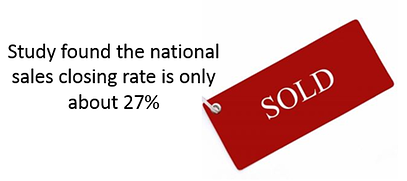When you’re in a selling situation, it’s often uncomfortable to ask for the sale - it just doesn’t feel right and makes you feel like just another pushy salesperson.
Studies by sales organizations have consistently identified closing the sale as the single most challenging aspect to implement. When salespeople are observed in live situations, studies found that nearly half of sales calls end without an attempt to close the deal.
So what’s the problem with asking for the sale? This article explains the following and you can learn more about sales closing techniques here
- What’s the discomfort asking for the sale
- When should you use closing techniques to close the deal
- When shouldn’t you use closing techniques to close the deal
- How to ask for the sale in a comfortable, respectful manner
What’s the discomfort asking for the sale?
If you’ve participated in a sales training class you probably were exposed to several what they call “closing techniques”. These are techniques used by salespeople to get you to say “yes” even though you may not be totally comfortable. Here are some examples of “techniques” – some you may have experienced first-hand.
- Alternative close – “would you like to purchase 2 items or 3?”
- Urgency close – “if you buy today, we can take 5% off the price”
- Competitive threat – “we can only sell this to one competitor and if you don’t buy it your competitor may”
When you hear things like this there’s little wonder why salespeople get a back rap. Statements and questions like these put pressure on the customer to decide. Consequently, many salespeople feel discomfort in using them. But, they are appropriate in some circumstances – read on.
When should you use closing techniques?
Studies found there’s an inverse correlation between the price of the sale and the use of closing techniques – the bigger the sale, the fewer closing techniques you should use. Following are a couple of examples.
- You’re in a store looking at dress shirts that cost $40 each. The salesperson asks, “Would you like to buy that in blue or yellow or both?” (Alternative close). This question doesn’t give you much discomfort because there’s little at stake. $40 is $40 but it won’t change most people’s lives.
- You’re shopping for a children’s game that costs $70. The salesperson states, “We are running a promotion and if you buy today you’ll get a $5 gift card toward a future purchase. Would you like to get it today?” (Urgency close). In this situation you might very well thank the salesperson rather than be put off by the pressure to buy.
In smaller sales situations, studies have found the use of closing techniques have at least a neutral effect on closing rates and often a positive effect.
When should you NOT use closing techniques?
The bigger the sale the less you want to use closing techniques. If your buyer is considering a $5,000 investment and you “pressure” him into making a decision by a certain date, the buyer may well consider your “urgent close” attempt as pushy and manipulative. This may tarnish your reputation.
If you’ve done your job well, uncovered problems you can solve, presented solutions that make sense, responded to objections and answered all the customer’s questions, your customer may have sold himself. Pressure him to make a decision by using a closing technique and you may put the sale at risk. But, you don’t just want to leave this discussion dangling or wondering what’s to happen next. In other words, ask for the sale, but do it right.
How to ask for the bigger sale?
You’re at the end of the sales process with a qualified prospect considering a large purchase and it is time to ask for the sale. What’s a good way to do it without appearing pushing and/or manipulative? Here are good questions to ask for the sale
- Based on our schedule, we can get started next week. Would you like us to schedule it?
- If we can meet your timing requirements, would you like to get things started?
- We’re confident we can achieve your objectives. Would you like to get started?
- How would you like things to proceed from here?
- What would you like the next step to be?
Few salespeople would be uncomfortable or feel like a “snake oil salesman” by asking for the sale using any of these questions.
In summary, the larger the sale the less you want to use closing techniques when asking for the sale. When the stakes (and dollars) are high, pressuring the customer to make a decision before he’s comfortable can jeopardize your reputation and the sales opportunity. But, always ask for the sale by doing so in an honest, straightforward way. You’ll stand a better chance of closing the deal.
You may also be interested in ...
Improve Your Selling Skills – Be a Better Listener






Agree, disagree, or just have something to add?
Leave a comment below.